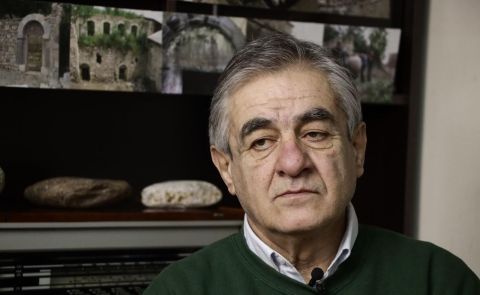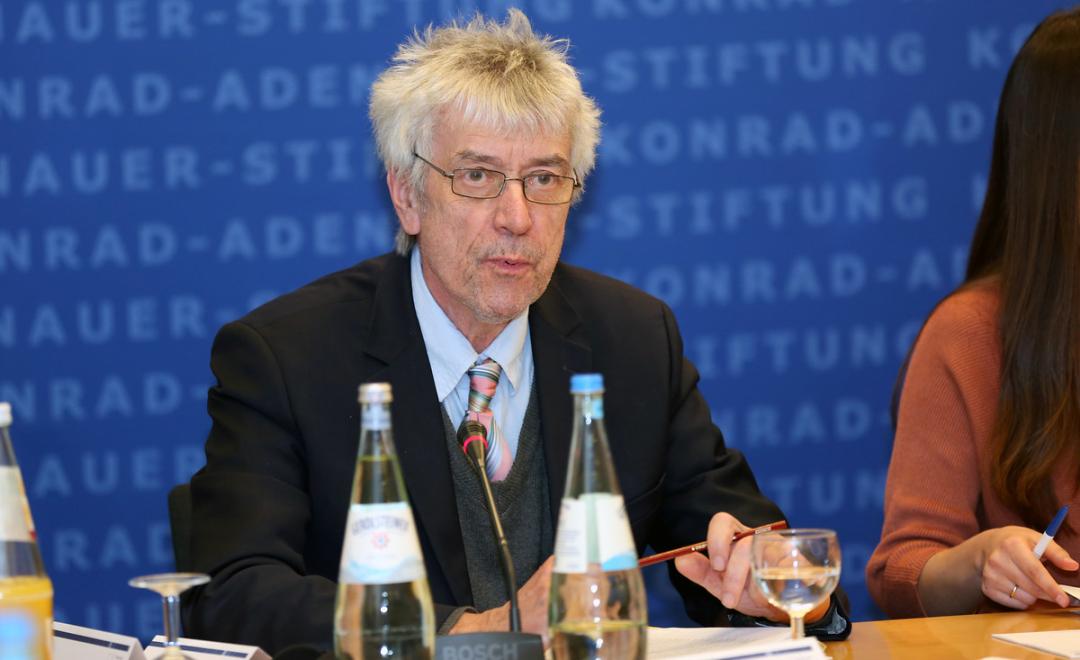
Dr. Uwe Halbach on the situation in the Caucasus during the Corona crisis

Dr. Halbach has been working for the research section for Eastern Europe and Eurasia at the prominent German think-tank SWP since 2001. His fields of research include the formation of national identities and statehood in the post-Soviet space - especially in the Caucasus and Central Asia; Secessionist conflicts in the Caucasus as well as Islam and Islamist movements in the post-Soviet space. (Dr. Halbachs numerous German publications are available here).
Dr. Halbach, the North Caucasus appears to be particularly badly affected by the outbreak of the coronavirus. Are there any socio-economic reasons for this?
The North Caucasus is considered a problematic region of the Russian Federation in socio-economic terms. The budgets of these republics were previously highly dependent on subsidies from Moscow, which are now in decline. The healthcare-sector is the area most affected by infrastructure deficiencies during the Corona crisis. There are reports of a general gap between the center and the regions in Russia when it comes to the equipment and performance of clinics. Health care is particularly poor in the Northern Caucasus. Some hospitals raised dissent against these deficiencies. The names of medical professionals who died were listed on the Internet. Dagestan was particularly affected. Another social factor that should be highlighted in regard to the North Caucasus relating to the pandemic is the strong cohesion of clans and families. At the beginning of the pandemic, mass gatherings at weddings and religious festivals were reported from Dagestan and other parts of the region, which became "hot spots" for the spread of infection. Later, the Islamic clergy also started to warn that people should keep their distance and comply with rules on infection control.
Russia has been criticized from the beginning of the coronavirus outbreak for a lack of transparency and a late response by the Kremlin. Do you think that the situation in the North Caucasus republics could have been prevented if a different approach would have been adopted by the central government?
Lack of transparency is generally the problem regarding the communication between authorities and the population during COVID. This applies to the North Caucasus as well as to the entire Russian Federation. During this crisis, Putin has increasingly delegated responsibility for the countermeasures to the heads of the republics and governors at the regional level. An autocratically governed republic like Chechnya is far from being transparent.
Do you see any signs of a possible improvement of the situation in Dagestan?
The leader of the republic Vasiliyev announced on May 26 that the situation in Dagestan is under control and is gradually improving. He thanked for the help from the federal government, which was already having positive impacts. The Russian military has set up field hospitals for Covid-19 patients. Though the claim that the dynamic of infection is really “under control”, raises considerable doubts in Dagestan. At the end of May, Dagestan accounted for more than 300 of around 400 corona-related deaths in the North Caucasus federal district. However, Dagestanis also the largest republic with three million inhabitants. The number is likely to be even higher, since in the past few weeks there have been general doubts in Russia about the figures for the Covid-19 fatalities, which appear to be too low.
The Azerbaijani leadership has also expressed concern about the situation in Dagestan, and President Aliyev has exchanged views with President Putin about possible ways of cooperation. Has anything already happened in this regard?
According to the press, telephone calls between the two presidents and the two foreign ministers "discussed joint actions in the fight against the pandemic, including mutually agreed measures at the border checkpoints". So far, these measures relate to opening the previously closed state border for the evacuation of people of Azerbaijani origin from Dagestan to Azerbaijan. In an interview with Aliyev, Putin called the situation in Dagestan "difficult" and expressed the dire need for support in the region. So far, I have not become aware of joint actions going beyond the opening of the border.
Chechnya’s political leadership has put strict restrictions in place in order to contain the virus. Critics see this as a renewed attempt by the Chechen authorities to secure their power. Do you think that these new restrictions will be completely lifted after the outbreak has ended?
I do not expect that. Ramzan Kadyrov tightened political control over the media and civil society forces in Chechnya long before the Corona crisis and will hardly reverse the strengthening of control that happened during the pandemic, even after the quarantine measures are beginning to relax. He has ordered the toughest punishments for breaking the measures imposed in March, he has even made death threats to people who do not follow them. At the beginning of the pandemic, on the other hand, he had made threats against “panic-mongers” and rather downplayed the danger.
What do you judge to be the biggest local and / or global economic challenges for the North Caucasus in the wake of the epidemic?
As already mentioned, a major challenge arises from the overburdening of local health systems, which are unable to adequately treat infected people without substantial help from the central government of the Russian Federation or from outside. In addition, if the Corona crisis persists, growing frustration among local people could become a challenge for the political center. In Russia, one of the strongest reactions to the lockdown measures imposed came from Vladikavkaz, the capital of the North Caucasus Republic of North Ossetia. On April 20, up to 2,000 demonstrators allegedly gathered there and demanded that isolation measures be lifted and Republican leader Bitarov to resign. The greatest socio-economic challenge for the development of the region after Corona are the hardly manageable measures to rebuild the economy that shrank during the pandemic. The federal budget is now under too much pressure to expand or even keep subsidies for the highly dependent Caucasian periphery. Financial aid measures for population groups whose economic existence is endangered by quarantine measures also face particular obstacles in the North Caucasus. The share of the informal economy and the labor force employed in it is high in the region. And such help goes past these groups of people, if it can be provided at all.
Finally, can you give us an assessment of the reaction of the three South Caucasus countries?
The South Caucasus has so far held a rather positive position in global corona statistics. The registered number of infections per capita is much lower here than in most EU countries, not to mention corona epicenters such as the USA, Brazil and Russia. At the end of May, the officially stated total number of infection cases in the South Caucasus amounted to approx. 15,000, the number of those who died from Covid-19 to 200. However, it is striking how the case numbers between Georgia and Armenia diverge. In Armenia, the official numbers of infection cases are approx. 9,000 and the figure of 130 deaths is ten times higher than in the neighboring country. The situation in Armenia also looks bad compared to Azerbaijan. Georgia reacted to the threat posed by Corona with strict measures at the beginning of March after the first case of infection was reported on February 26. The government received praise from international organizations for this. The easing of the lockdown in the three countries is currently beginning. For Georgia, the tourism sector is particularly important, as it still contributed an estimated 20 percent to its economic output in 2019. Prolonged closure of this sector would significantly weaken the country's economy.
Interviewed by Philip Röhrs-Weist
See Also


Irina Mamulashvili: Electoral Interference is a Playbook, not a Recipe

Giorgi Gakharia: The EU Should Engage Georgia Despite Its Democratic Backsliding

Peace or Capitulation? Shahverdyan on Armenia-Azerbaijan Agreement and the Nagorno-Karabakh Crisis

Ali Mousavi Khalkhali: Iran Will Avoid Conflict in the Caucasus

